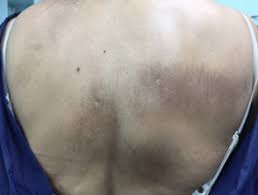MedicalResearch.com Interview with:
Wolfgang Liedtke, M.D., Ph.D.
Professor (tenured) of Neurology, Anesthesiology and Neurobiology
Attending Physician, Duke Neurology Clinics for Headache, Head-Pain and Trigeminal Sensory Disorders
Attending Physician, Duke Clinics for Innovative Pain Therapy at Brier Creek (Dept of Anesthesiology)
Duke University School of Medicine, Center for Translational Neuroscience
Durham NC 27710
Since April 2021
Chair of Neurology
Global Development Scientific Council
Regeneron Pharmaceuticals
Tarrytown NY 10591
MedicalResearch.com: What is the background for this study?
Response: There are systemic diseases that are characterized by intense itching, yet without inflammation of the skin and not associated with allergic inflammation. For example and importantly, liver disease with non-functional secretion of bile (cholestatic liver disease, most common primary biliary cholangitis, an autoimmune disease), but also chronic end-stage renal disease (also certain lymphomas and pruritic psoriasis where the itch is whole-body, not only restricted to diseased skin).
We thought that these diseases might be great starting points to better understand itch because there is no inflamed skin and no allergies. Thus, there must be some systemic factor that causes itch, and we were intent on discovering such factors, and with them, molecular mechanisms how they cause itch.
For cholestatic liver disease, one of the best candidates to fit this profile has been lysophosphatidic acid (LPA), since the pioneering discoveries of Andreas Kremer, one of our co-authors.
My research laboratory at Duke has been rooted in my discovery of TRPV4 ion channels 20 years ago, out of the Friedman Lab at The Rockefeller University in NYC. Over the years, with my colleague Yong Chen out of my lab, now leading his own independent research operation, we focused on the role of TRPV4 ion channels in skin. 5 years ago Yong and I published a paper that provided some evidence for TRPV4 in skin perhaps playing a role in itch.
Working with phospholipids, we made the serendipitous discovery that lysophosphatidyl choline (LPC) is a more potent itch-inducing lipid molecule than LPA. Of note, LPC is the metabolic precursor of LPA. We then found that LPA does not depend on TRPV4 to elicit itch. The more robust itch evoked by LPC was significantly reduced when we knocked down TRPV4 in skin keratinocytes. Itch was NOT affected when TRPV4 was deleted from sensory nerve cells that innervate the skin.
In terms of background, my long-term goal has been to elucidate how innervating peripheral nerve cell and innervated organ, such as skin, talk to one another so that the sensation that is felt is regulated or modulated, e.g how can skin influence itch or pain, how can joint cells influence pain.
That became the exciting bedrock of our study, and we took it from there, 5 years of hard work with collaborations spanning the globe, and a final stretch of exhausting work during the pandemic.
(more…)










